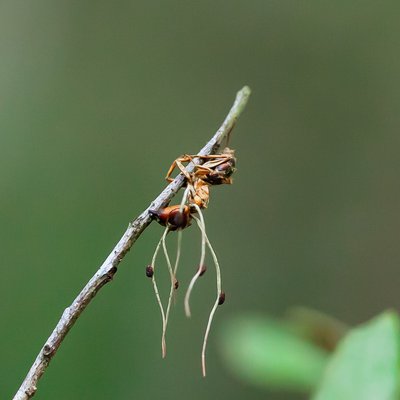Ophiocordyceps and zombie ants
Project description
Members of the fungal genus Ophiocordyceps can infect ants and manipulate their behavior. Under the influence of the fungus, the ants will climb up a tree where they eventually die. These infected ants are called zombie ants. Next, a fruiting body grows out of the head of the ant, spreading the fungal spores over the ant colony below.
The aim of the project is to identify the genes involved in behavior modification. This is accomplished by infection experiments, genome sequencing, and RNA-Seq transcriptomics during behavioral modification. So far, many candidate genes have been identified that likely play a role: enterotoxins, secondary metabolites, and other secreted proteins and molecules. Furthermore, it appears that the fungus affects the biological clock and olfactory senses of the ant.
This research project is a collaboration with the lab of Charissa de Bekker, who has recently moved from the University of Central Florida to Utrecht University. All lab experiments are performed in her group, and some of the bioinformatics has been done in our group. All the genome sequences that resulted from this project are available as Genome Portals.

Figure. An ant that was infected by the fungus Ophiocordyceps camponoti-floridani. The white strands are the fungal fruiting body growing out of the ant. Photo by Roel Fleuren.
Lab members currently working on this project
- Robin Ohm (Assistant professor)
Genome portals
- Niveomyces coronatus CBS 149186
- Ophiocordyceps australis 1348a (Ghana)
- Ophiocordyceps australis map64 (Brazil)
- Ophiocordyceps camponoti-floridani
- Ophiocordyceps camponoti-rufipedis
- Ophiocordyceps kimflemingae
- Ophiocordyceps subramaniannii
- Torrubiellomyces zombiae CBS 149187
Publications
Masters of the manipulator: two new hypocrealean genera, Niveomyces (Cordycipitaceae) and Torrubiellomyces (Ophiocordycipitaceae), parasitic on the zombie ant fungus Ophiocordyceps camponoti-floridaniAraújo JPM, Lebert BM, Vermeulen S, Brachmann A, Ohm RA, Evans HC, De Bekker CPersoonia: Molecular Phylogeny and Evolution of Fungi. 2022 Dec; 49: 171-194. doi: 10.3767/persoonia.2022.49.05
Genetic Underpinnings of Host Manipulation by Ophiocordyceps as Revealed by Comparative Transcriptomics.Will I, Das B, Trinh T, Brachmann A, Ohm RA, de Bekker CG3 (Bethesda). 2020 Jul; 10(7): 2275-2296. doi: 10.1534/g3.120.401290
Ant-infecting Ophiocordyceps genomes reveal a high diversity of potential behavioral manipulation genes and a possible major role for enterotoxins.de Bekker C, Ohm RA, Evans HC, Brachmann A, Hughes DPSci Rep. 2017 Oct; 7(1): 12508. doi: 10.1038/s41598-017-12863-w
Gene expression during zombie ant biting behavior reflects the complexity underlying fungal parasitic behavioral manipulation.de Bekker C, Ohm RA, Loreto RG, Sebastian A, Albert I, Merrow M, Brachmann A, Hughes DPBMC Genomics. 2015 Aug; 16: 620. doi: 10.1186/s12864-015-1812-x
